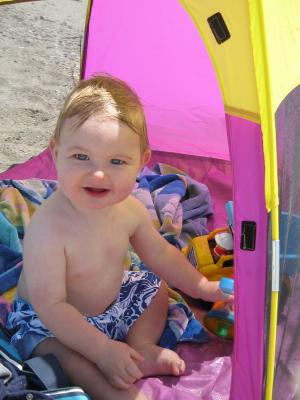Hot town, summer in the city / Back of my neck getting dirty and gritty / Been down, isn't it a pity / Doesn't seem to be a shadow in the city.
All around, people looking half dead / Walking on the sidewalk, hotter than a match head.
The great lyrics of "Summer in the City," my favorite song from Lovin' Spoonful, really sum up these recent weeks.
Grass is drying up, gardeners are hastily watering, kids are splashing in bright plastic pools and the rest of us are just trying to keep the sweat at bay - it's summer!
Water, water, water
For most of us, summer means time at the beach, extra time with the kids and firing up the grill. But, don't forget to add sun protection and hydration to the mix.
Hot summer days can really take it out of our kids. Keep bottles of water handy in a cooler for both the kids and the adults. Nothing can spell disaster more quickly than a dehydrated kid. And, for us, dehydration leads to lethargy, which is not the way to keep up with those little ones.
Make sure it is water that you pass around the campfire. Water is the best way to stay cool and hydrate. Stay away from fruit juices and soda, which can increase dehydration.
A note on baby pools
Little plastic pools can be a lot of fun for kids and adults, and even dogs, but they also pose hazards for small kids. Make sure to always supervise around pools. If it is a real pool that is deeper than kids are tall, always keep a life jacket or floaters on them. And, stay right there, with your eyes on them. It only takes a moment for disaster.
Sun protection
Droolface loves the beach. He loves splashing in the waves and playing in the sand. Well, sometimes he is eating the sand, but either way, he really enjoys it. He does not know that he needs sun protection. But, parents do.
Lately, there has been much debate about sun protection. Recent reports of sunscreen increasing cancer and not really protecting our skin abound. But, I say caution first. I always put a baby-safe sunscreen on Alex and reapply if he is in and out of the water.
More importantly, I pay attention to the time. Small children and especially infants should not be outside in the sun for long periods of time. While sunscreen can protect them, it is limited.
Keep a hat on the kids as much as possible. Some hats now have sunscreen embedded as well.
Another idea is to keep a kid-safe shaded area available. I love tents for this purpose. Tents come in all shapes and sizes, but they are great in a pinch to find a shady spot. We have a small tent for the beach and a slightly larger one for at home.
Droolface loves being in the tent. It is like his mobile playroom. It can be a struggle to keep the sand out, but sometimes, you just have to go with it.
Some skin cancer facts:
According to the Skin Cancer Foundation: "Current evidence points to the need to protect skin against the sun’s rays, regardless of skin type and ethnicity, and most dermatologists recommend using sunscreens that protect against both ultraviolet A (UVA) and ultraviolet B (UVB) rays, in addition to following other protective measures to lower the risk of cancerous and precancerous lesions."
• Skin cancer is the most common form of cancer in the United States. More than 3.5 million skin cancers in over two million people are diagnosed annually.
• Each year there are more new cases of skin cancer than the combined incidence of cancers of the breast, prostate, lung and colon.
• One in five Americans will develop skin cancer in the course of a lifetime.
• Over the past 31 years, more people have had skin cancer than all other cancers combined.
Prevent skin cancer:
• Find some shade. The sun is strongest from 10 a.m. to 4 p.m., so limit outdoor exposure during this time. If you're outside, head under a pavilion roof or leafy tree - or carry a sun umbrella.
• Don't get burned. Even a single sunburn increases your risk of developing melanoma, the deadliest form of skin cancer; suffering five or more sunburns doubles your lifetime risk, says Skin Cancer Foundation.
• Carry protective clothing. A little sunshine can make us feel positive effects of warmth and Vitamin D, but make sure to have clothing available to cover up once you feel your skin start to redden. Keep a hat and SPF protection nearby.
• Reapply SPF every two hours. Prior to going out, lather on SPF 15 or higher sunscreen, then make sure to reapply regularly.
- For more information, go to www.skincancer.org.





















































